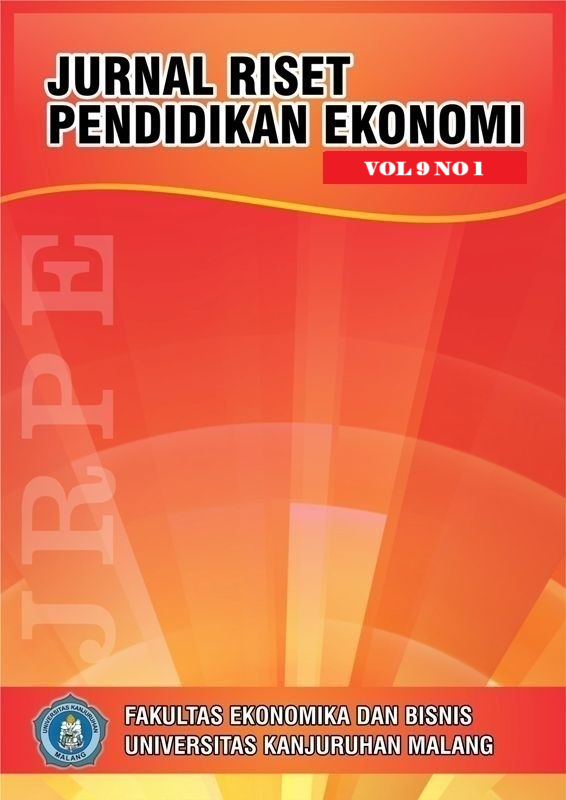Model Mapping-Project Menggunakan Business Map Berbasis Potensi Lokal
Main Article Content
Abstract
Pemanfaatan potensi lokal sebagai upaya peningkatan keterampilan dan kesejahteraan berbasis kewirausahaan tercakup dalam capaian pembelajaran mata pelajaran Produk Kreatif dan Kewirausahaan (PKK) di SMK. Guru PKK dituntut untuk dapat mengembangkan model pembelajaran kreatif, adaptif dan berbasis praktik sehingga siswa memiliki pengalaman belajar yang cukup untuk menumbuhkan keyakinan diri dan kompetensi. Dengan menerapkan model mapping-project berbasis potensi lokal, siswa mampu menyusun rencana bisnis dalam bentuk business map secara berkelompok sehingga keterampilan berwirausaha siswa meningkat.
Article Details
Jurnal Riset Pendidikan Ekonomi is licensed under a Creative Commons Attribution-ShareAlike 4.0 International License. The copyright of the received article once accepted for publication shall be assigned to the journal as the publisher.
References
Bagheri, M., Zah, W., Ali, W., Chong, M., Abdullah, B., & Daud, S. M. (2013). Effects of Project-based Learning Strategy on Self-directed Learning Skills of Educational Technology Students. Contemporary Educational Technology, 4(1), 15–29.
Bell, R. (2015). Developing the next generation of entrepreneurs: Giving students the opportunity to gain experience and thrive. International Journal of Management Education, 13(1), 37–47. https://doi.org/10.1016/j.ijme.2014.12.002
Botha, M. (2010). A project-based learning approach as a method of teaching entrepreneurship to a large group of undergraduate students in South Africa. Education as Change, 14(2), 213–232. https://doi.org/10.1080/16823206.2010.522059
Fayolle, A., & Gailly, B. (2015). The impact of entrepreneurship education on entrepreneurial attitudes and intention: Hysteresis and persistence. Journal of Small Business Management, 53(1), 75–93. https://doi.org/10.1111/jsbm.12065
Henrekson, M. (2007). Entrepreneurship and Institutions. Ssrn, 2(1), 74–89. https://doi.org/10.2139/ssrn.996807
Hujer, B. Y. R., Thomsen, S. L., & Zeiss, C. (2006). T h e effects of vocational training p r o g r a m m e s on the duration of u n e m p l o y m e n t in Eastern Germany *. 321(2001), 299–321.
Indonesia, K. K. (2019). STATISTIK. (41), 1–16.
Järvi, T. (2012). Teaching entrepreneurship in vocational education viewed from the regional and field perspectives. Journal of Vocational Education and Training, 64(3), 365–377. https://doi.org/10.1080/13636820.2012.691538
Ruskovaara, E., & Pihkala, T. (2015). Entrepreneurship education in schools: Empirical evidence on the teacher’s role. Journal of Educational Research, 108(3), 236–249. https://doi.org/10.1080/00220671.2013.878301
Solomon, G. (2007). An examination of entrepreneurship education in the United States. Journal of Small Business and Enterprise Development, 14(2), 168–182. https://doi.org/10.1108/14626000710746637

